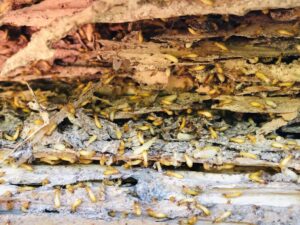The bark scorpion is nocturnal and prefers to ambush its prey, usually feeding on crickets, roaches, beetles, and other small insects. Arizona bark scorpions have a gestation period of several months, are born live, and are gently guided onto their mother’s back. The female usually gives birth to anywhere from 25 to 35 young. These remain with their mother until their first molt, which can be up to 3 weeks after birth. Arizona bark scorpions may live up to 6 years. The baby scorpion can have the worst sting if it lands near you, as they have no control over the amount of venom. They do look to keep warm in your home. The bark scorpion is particularly well adapted to the desert, as layers of fat on its exoskeleton make it resistant to water loss. Nevertheless, bark scorpions hide during the heat of the day, typically under rocks, wood piles, or tree bark. Bark scorpions do not burrow, and are commonly found in homes, requiring only 1/16 of an inch for entry.
Arizona bark scorpions prefer moist and cool places. The popularity of irrigated lawns, and other systems which increase environmental humidity in residential areas, has led to a massive increase in the number of scorpions in some areas.
Bark scorpions, like most other scorpions, are incredibly resilient. Here is an example: During U.S. nuclear testing, scorpions, along with cockroaches and lizards, were found near ground zero with no recorded adverse effects.
While nearly all scorpions are solitary, the Arizona bark scorpion is a rare exception: during winter, packs of 20 to 30 scorpions can congregate, so here in Arizona we are never without scorpions.
FIRST AID
- Basic first aid measures can be used to help remediate scorpion stings:
- Clean sting site with soap and water
- Apply a cool compress (cool cloth)
- Take acetaminophen or ibuprofen for local pain and swelling
If the pain worsens, or you have breathing issues seek medical attention immediately. Scorpion stings can have the same effect on you as if you were stung by a bee. Some people react differently to venom.
MEDICAL EMERGENCIES
Since the amount of venom a scorpion injects varies, Arizona poison control centers suggest immediate medical attention only in the event of extreme pain or stings involving weaker individuals, the elderly, and babies. As stated previously, if you develop breathing issues seek medical attention immediately. Some people react differently to their venom.
Scorpions are incredibly resilient. During US nuclear testing, scorpions, along with cockroaches and lizards, were found near ground zero with no recorded adverse effects. Scorpions are predatory arthropods with a venomous stinger; they commonly hide in rocks, wood piles, block walls palm tree trunks, and debris. They will go to higher ground to keep cool and seek the coolness of an opening in your home and enter to enjoy the coolness. They tend to blend in so you need to wear some sort of slipper or shoe just in case. They will sting you if you get near them if they feel threatened.
Treatment: We highly recommend monthly or bi-monthly spraying at all of the potential entry points. Our products can kill them, and with regular service, we can keep them away and out of your yard and home. The right kind of treatment spray is crucial and effective for getting these pests out of your home. We will conduct a full inspection of your property, notify you of areas that are conducive areas, crevices, and cracks ripped screens, and any conducive area we see.
